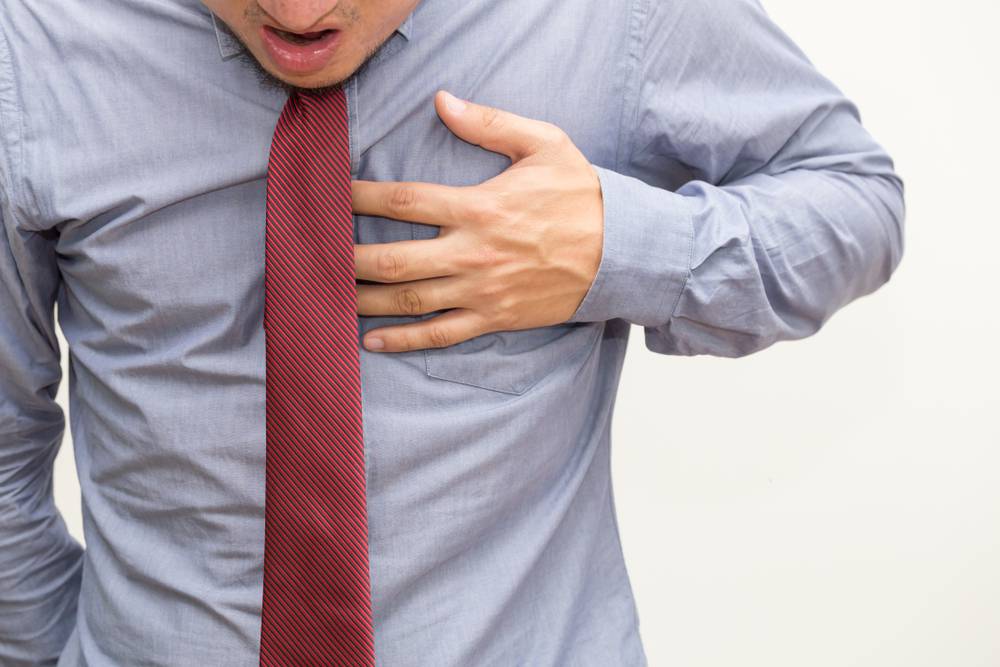Subscribe to get weekly insights
Always stay up to date with our newest articles sent direct to your inbox
Published on 15 Oct, 2019
Updated on 21 Nov, 2023
1355 Views
3 min Read

Written by Care Health Insurance
favorite0Like
favoriteBe the First to Like
A variety of factors ranging from obesity to chronic stress can contribute to a myocardial infarction, commonly known as a heart attack. The exhibitive symptoms can often be subtle or seemingly innocuous in the initial stages. In fact, a majority of serious heart attacks are preceded by stomach aches or shoulder pains that are casually passed off as transitory, everyday discomforts. The symptoms of heart attacks are not uniform across all cases, hence it is best to seek medical help to prevent potentially life-threatening situations if any of the following symptoms are observed
Widely regarded as the ‘Hollywood Heart Attack’ owing to its depiction in the media, chest discomfort is either felt as a tightness, dull pain, or pressure in the chest area. It is the most telltale sign of a heart attack, thus demanding immediate medical attention. This feeling generally does not persist beyond a couple of minutes. It might occur abruptly, either when the patient is physically strained or completely at rest. In several cases, and especially in women, heart attacks can occur even when there is no chest pain. The heart attack symptoms for men almost always include a certain degree of discomfort in the chest.
Nausea, vomiting, stomach aches, retching, heartburns, and indigestion are commonly reported symptoms both before and during a heart attack. As these conditions can be indicative of a large array of other health issues as well, it is difficult to recognize a heart attack solely based on these symptoms. This tends to be amongst the more frequent symptoms of a heart attack in Women although it is an equally important symptom of a heart attack in men as well.
It is imperative to consult a medical professional if you face dizziness and lightheadedness occurs in combination with chest pain or any other symptoms. In the case of a heart attack, lightheadedness stems from an inability of the heart to pump a sufficient amount of blood to the upper body.
>> Check: Best Health Insurance Policy Online
The degree of exhaustion and the activity that preceded is crucial to attributing this symptom to heart diseases. Patients will often feel breathless even after being involved in simple physical activities such as climbing stairs or lifting weights that they could previously lift effortlessly. A lingering weakness that remains for several days may also be indicative of a severe heart illness. This is one of the prime symptoms of heart attack in women.
Most heart attacks start out as a chest pain that gradually spreads to different parts of the body. Pain that moves down the left arm or back can be considered as typical symptoms of heart attack for men over the age of 50. In rare cases, pain in the left arm might not be accompanied by chest pain at all. Chest pain may also spread to the throat and jaw in some instances.
When the heart is unable to cope with the body’s requirements, blood spills into the lungs, causing white or pink mucus to be ejected during a long-lasting cough. This is a dire sign of heart failure and requires immediate attention. This might also be accompanied by a sudden cold sweat.
Before a heart attack, the heart struggles to effectively pump blood all the way to the extremities of the body. This causes the blood to move sluggishly in the veins, resulting in a strange swelling of the feet or ankles. This can also be a consequence of the kidney’s inability to process extra sodium due to reduced inflow of blood from the heart.
Normal periodic snoring turnings to gasping for breath and choking, Is often a sign of sleep apnea. This will cause the patient to temporarily stop breathing while sleeping, thus intensifying the stress on the heart. Although it cannot be considered as a direct symptom of a heart attack, it is still essential to get it checked by a doctor.
Owing to the unpredictability and crippling harm inflicted by heart attacks, it is essential for individuals of all ages to shield themselves and their families with health insurance that specifically covers heart ailments. Care Health Insurance offers two specialized heart insurance policies: Heart Mediclaim and Care Heart.
The Care Heart policy covers pre-existing heart illnesses and indemnity based Heart Mediclaim, provides coverage for 16 heart illnesses that might occur in the future. Both plans offer pre and post hospitalization, room rent, and a range of other facilities. If all the symptoms seem to point to a heart attack, the victim must refrain from driving to the hospital or indulging in physical activity of any kind. It is always prudent to call for an ambulance.
>> Also Read What is the First Aid for Heart Attack?
Disclaimer: Underwriting of claims for heart ailments is subject to policy terms and conditions.
favoriteBe the First to Like
शुगर कंट्रोल कैसे करे? जानें, डायबिटीज में क्या खाना चाहिए Care Health Insurance in Health & Wellness
Thyroid : मामूली नहीं हैं महिलाओं में थायराइड होना, जानें इसके लक्षण और घरेलू उपचार Care Health Insurance in Diseases
हाई ब्लड प्रेशर को तुरंत कंट्रोल कैसे करें? देखें इसके उपाय Care Health Insurance in Diseases
प्लेटलेट्स की कमी के लक्षण, कारण और इलाज क्या है Care Health Insurance in Diseases
Dehydration: What Your Body's Trying to Tell You Care Health Insurance in Health & Wellness
Breaking Down Neurosis vs Psychosis—Meaning, Differences, & More Care Health Insurance in Mental Health
Is Black Pepper Good for You? 11 Health Benefits of Fiery Spice! Care Health Insurance in Diet & Nutrition
What is IBS? Signs, Triggers & Solutions that Work Care Health Insurance in Diseases